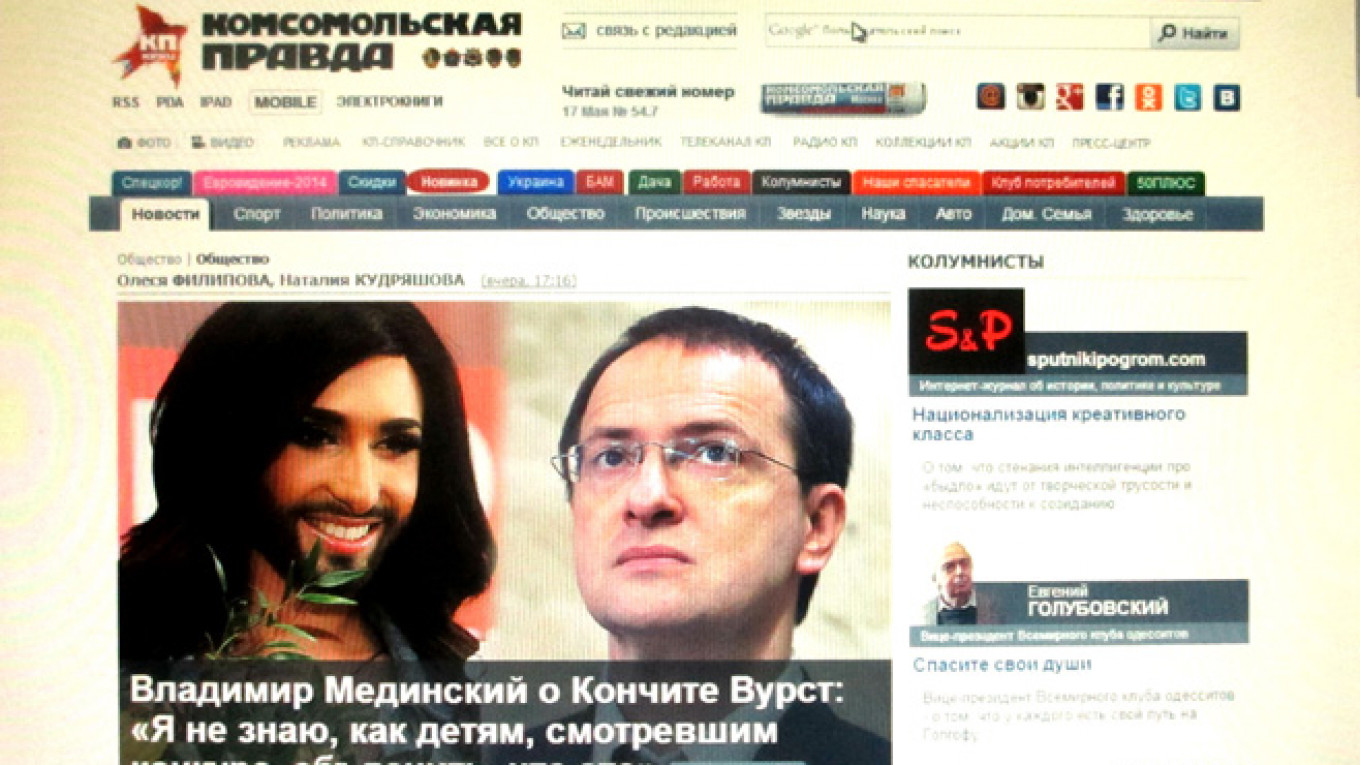Russian Culture Minister Vladimir Medinsky received an honorary fellowship on Thursday a few days late and not quite as planned.
The institution doing the honors was Ca' Foscari University of Venice, Italy, but a planned ceremony in Italy on May 12 was junked at the last minute. Instead, the honor was publicly presented to Medinsky in Moscow on Thursday. The official reason for the delay and change of venue, according to Radio Svoboda, was a conflict in the Minister's schedule. Or, as many media outlets have reported, the change may have come about as a result of a protest among students and faculty in Venice, claiming that Medinsky was unworthy of the honor.
As reported in The Local, an English-language site for news about Italy, Medinsky raised hackles in Europe a month ago when he suggested that European culture has grown depraved and put forth Russia as "the last keeper of European culture, Christian values and truly European civilization."
On the same day Medinsky was honored by the Italian university, a group of 50 Russian writers and artists condemned the event in an open letter published on Colta.ru. In part, the letter stated that, "The awarding of an honorary degree by a European university to one of the most odious figures in contemporary Russian cultural politics, one who does battle with European values, multiculturalism and tolerance, will inflict damage on the reputation of the educational institution..."
This latest incident does not particularly stand out in the larger scheme of things. It is, however, still another example of how Medinsky, more than any Russian minister of culture in recent memory, has — by choice and by fortune — inserted himself into the story of Russian culture. Most of the time, it has had little to do with culture as art, and much to do with culture as ideology and morality.
It is a sign of the rapidly shifting times, a period in which the public is encouraged to choose sides for or against ideas, policies, opinions and people.
This can be gleaned in an interview published on Wednesday by Izvestia, wherein Medinsky discussed the now-notorious letter composed in March by the Ministry of Culture and signed by hundreds of prominent Russian artists who supported President Vladimir Putin's policies in Ukraine. He claimed that the idea for the open letter came about because "two or three" famous cultural figures, "always the same people," were constantly criticizing Putin's position.
Rather than to seek a consensus or a way to lower the temperature of dissent, the purpose of the March letter was to drive a wedge between cultural figures, to ferret out who was with the government and who was against it.
Also hitting the news on Wednesday was a report that Medinsky's ministry is now preparing, in observance of a new law that goes into effect on July 1 against obscenities in art, to gather information on who is cussing on stage, page or screen, and where it is happening.
"From this moment on any citizen has the right to complain about expletives in works of art by writing a letter to the Ministry of Culture or to its territorial organs," an article in Izvestia declares. The publication even provides a hyperlink to a web page where disgruntled individuals may file their complaints.
Violators face various fines ranging from 2,000 to 50,000 rubles ($58 to $1,440) depending upon their status as private or official individuals, while institutions repeating offenses may be closed down for up to three months.
Meanwhile, in an issue that one might think does not concern the Russian minister of culture at all, Medinsky continues to speak out publicly.
He remains, he declares, baffled by Conchita Wurst, the drag persona of Austria's Thomas Neuwirth, who was the victor in the latest Eurovision song competition. Speaking to the Saratov edition of Komsomolskaya Pravda on Friday, he stated, "I am having trouble making peace with Eurovision, or, more precisely, with the victory of the individual who won... I don't know how to explain what that was to children who watched the competition. What can I say to them?"
What all this means in the long run for Russia's real culture — that is, the writing, the performing, the painting, the playing of music — is quite unclear. What we do know is that we have a Culture Minister who is ready to put himself and his agency front and center in any given cultural story at any given moment.
A Message from The Moscow Times:
Dear readers,
We are facing unprecedented challenges. Russia's Prosecutor General's Office has designated The Moscow Times as an "undesirable" organization, criminalizing our work and putting our staff at risk of prosecution. This follows our earlier unjust labeling as a "foreign agent."
These actions are direct attempts to silence independent journalism in Russia. The authorities claim our work "discredits the decisions of the Russian leadership." We see things differently: we strive to provide accurate, unbiased reporting on Russia.
We, the journalists of The Moscow Times, refuse to be silenced. But to continue our work, we need your help.
Your support, no matter how small, makes a world of difference. If you can, please support us monthly starting from just $2. It's quick to set up, and every contribution makes a significant impact.
By supporting The Moscow Times, you're defending open, independent journalism in the face of repression. Thank you for standing with us.
Remind me later.







